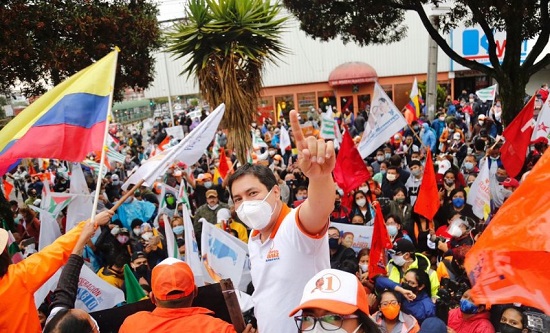
With less than a month until the Ecuadorian presidential elections, President Lenin Moreno and his right-wing allies have set their sights on privatising the country’s Central Bank. An emergency law is being fast-tracked through Parliament to place the Central Bank, Ecuador’s public and principle financial institution, into the private sector – in line with requirements dictated by the International Monetary Fund (IMF). This unconstitutional move is a desperate attempt by the deeply unpopular President to leave a lasting legacy of aligning Ecuador with the needs of US imperialism while wreaking economic havoc for the likely left-wing winner of the Presidential elections on 7 February.
Moreno’s betrayal of the Ecuadorian people, marketing himself as a puppet of US capital while forcing the Ecuadorian people to pay through intensified austerity measures, and his criminal handling of the coronavirus pandemic has left him with a disastrous 7% approval rating. Meanwhile Andres Arauz the candidate for the ‘Union of Hope’, a coalition of left-wing parties, leads the election polls with over 43% of predicted votes – 15% ahead of his closest rival.
The conservative CREO-PSC alliance of the Creating Opportunities party with the Social Christian Party takes second place in the polls, coming in at 25% of forecast votes. Guillermo Lasso, the billionaire banker who engineered the 1999 economic crisis which saw his personal fortune grow 310%, leads the alliance as he runs for office for a third time. He was recently exposed as hiring drivers to take part in a caravan in support of his candidacy and then failing to pay them. Meanwhile President Moreno’s Party, the PAIS Alliance, is predicted to come in fourth place with around 2% of the vote.
In the 2013 general elections PAIS won 57% of votes cast while headed by former-President Rafael Correa. PAIS stood as the political party dedicated to social and economic reforms, its social base made up of working class and indigenous Ecuadorians. It presided over the introduction of the Citizens Revolution project, designed to give more power to the Ecuadorian people. Imperialist economic intervention was rejected and poverty fell by one third. Moreno was elected on a ticket of continuing the process of ‘building socialism in the 21st century’. He backtracked as soon as he was elected, and the forces which once supported PAIS have abandoned the party.
Those forces are now organising to ensure the election of the Union of Hope. It was the strength of street mobilisations and protests, alongside international condemnation, which forced the National Electoral Council – closely associated with the ruling political class – to rescind its decision to ban the coalition party from running. Poor and indigenous Ecuadorians mobilised in defence of their sovereignty, rights and interests. The farcical charges Moreno’s administration has brought against Correa resulted in Correa being disqualified from running with Arauz as vice-President. Instead journalist Carlos Rabascall is the vice-presidential candidate.
As the Union of Hope established itself as a clear frontrunner in the polls, even after months of political persecution, the Moreno administration and its right-wing allies pushed for postponement of the elections. This would give them more time to implement the austerity measures agreed with the IMF as a condition for the multi-million-dollar loans they have received. Agreed measures still to be implemented include taking the Central Bank out of public hands and raising VAT by 3%. Ecuador on Q reported on how Article 143 of the electoral code stipulates that a change in the date of elections can result in the annulment of the entire electoral process. Presumably much to the dismay of the President and his backers, the National Electoral Council and the Electoral Tribune have confirmed agreement that the February 7 elections will not be delayed.
In this context, the new law for taking the Central Bank out of public hands is being rushed through Parliament. If passed, the law will have devastating effects for the mass of people in Ecuador. It would allow the ruling class to take billions of dollars out of the country to store in tax havens, while the public sector would be forced to subsidise this capital flight. The Board of Directors which would control the Bank and its economic policies would be named by Moreno. And the privatisation would limit any incoming president’s ability to use state funds to provide for Ecuador’s citizens.
Undoubtedly further attempts will be made by the ruling class to push through harmful IMF measures and to obstruct a smooth electoral process. We are already seeing attempts to restrict electoral observers and censor campaign materials. It is up to the Ecuadorian masses to organise against these measures as they have done to so far to secure the democratic right to free and fair elections. As he leaves office, Moreno’s real legacy is tens of thousands of deaths from the mishandling of Covid, the horror of dead bodies lining the streets amidst a healthcare collapse, mass unemployment, severe public-sector cuts and claiming the title of one of the most unpopular presidents in Ecuador’s history.
Ria Aibhilin




